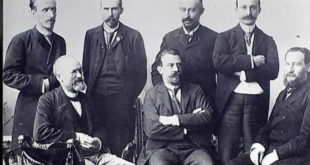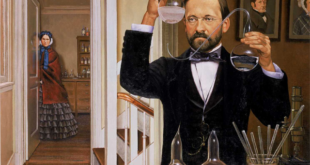It was Louis Pasteur who continued the spirit of the Ecole Polytechnique into late-Nineteenth century France. He saw very clearly the acute crisis that France had been going through since 1815, and he identified precisely the problem that had crippled the nation since the Congress of Vienna. The joy of discovery had been killed in the school system, and the “inner God” (as he put it, recalling Carnot’s commitment to “enthusiasm”) was no longer the praised emblem and principle of the Ecole. It had been replaced by the evil of radical positivism. By 1814, Auguste Cauchy and Auguste Comte had taken over the Ecole Polytechnique and had totally subverted its high purpose.12 They dumbed-down everything to what became known as Positivism, the “new religion of man”—what was later called “secular humanism.” This was the context for the following beautiful statement of Pasteur:
Positivism sins not only through methodological error. There is a considerable gap in its seemingly tight net of reasoning … The large and obvious flaw in the system consists in that the positivist conception of the world does not take into account the most important of positive notions—that of the infinite.
What lies beyond the starry vault of the heavens? More starry heavens. So be it! And beyond? Pushed by an invisible force, the human mind will never cease asking itself: What is there beyond? Does it want to stop either in time or space? Since an endpoint would be merely a finite dimension, greater only than those that had preceded it, no longer does the mind begin to envision it than this implacable question returns, and the mind cannot quell curiosity’s call. … Positivism gratuitously brushes aside this positive and fundamental notion, along with its consequences for the life of society. …
Are not the science and passion of understanding nothing else but the effects of the spur of knowledge, put in our souls by the mystery of the universe? Where are the real sources of human dignity, of liberty and of modern democracy, if not in the notion of the infinite before which all men are equal.
The spiritual bond situated [by the positivists—PB] within a sort of lower-level religion of Man, cannot reside elsewhere than within the higher notion of the infinite, because this spiritual bond must be associated with the mystery of the world. The Religion of Man is one of those superficially obvious and suspect ideas which brought one eminent psychologist to say : “I have thought for a long time that the person who has only clear and precise ideas must assuredly be a fool. For the most precious notions harbored by human intelligence are deeply behind-the-scene and in semi-daylight, and it is around these confused ideas, whose interrelations escape us, that the clear ideas gravitate, extending, developing, and germinating themselves.” If we were cut off from this background, the exact sciences would lose the greatness which they draw from the secret rapport they hold with those infinite truths whose existence we can only suspect.
The Greeks understood this mysterious power below the surface of things. It is they who bequeathed to us one of the most beautiful words of our language: the word enthusiasm, [which means] “inner God.”
The greatness of human actions is measured by the inspiration that gives them birth. Joyous is he who carries within him an inner God, an ideal of beauty, which he obeys: an ideal of art, an ideal of science, an ideal of his nation, an ideal of the virtues of the Gospel. These are the living sources of great thoughts and great actions, and all of them are lit by the gleam of the infinite.
—Louis Pasteur,
Speech delivered to the French Academy of Sciences, 1882
It is our role and responsibility, to elevate ourselves above this geometric plane that we have just begun to investigate, and to pursue this quest beyond the stars themselves. And if there should be some obscurity in our knowledge, let it be the proof that our quest has not ended, and that there lies beyond our feeble knowledge a higher accessible truth, a more joyful land of discoveries which are based on the principles of the discoveries of the past. That such discoveries are the pillars upon which the nation-state is erected, there is no doubt; and because it is so, we should replicate them everywhere we go, and let their very principles triumph on their own merit. (Pierre Beaudry, The Metaphor of Perspective, Fidelio, Summer 1995.)
 Pasteur Brewing Louis Pasteur – Science, Health, and Brewing
Pasteur Brewing Louis Pasteur – Science, Health, and Brewing 


